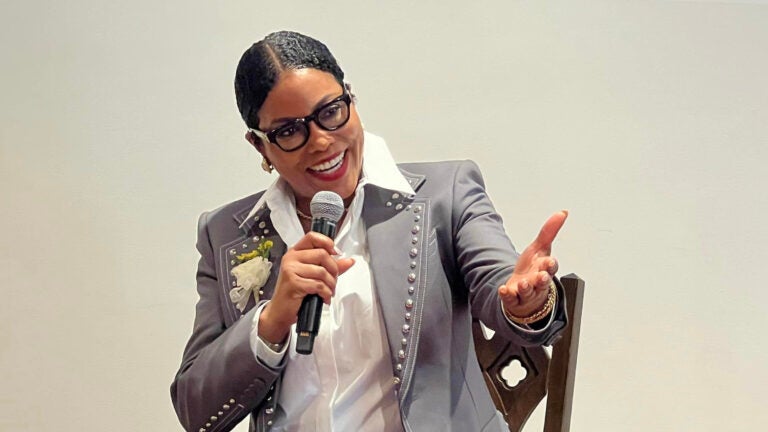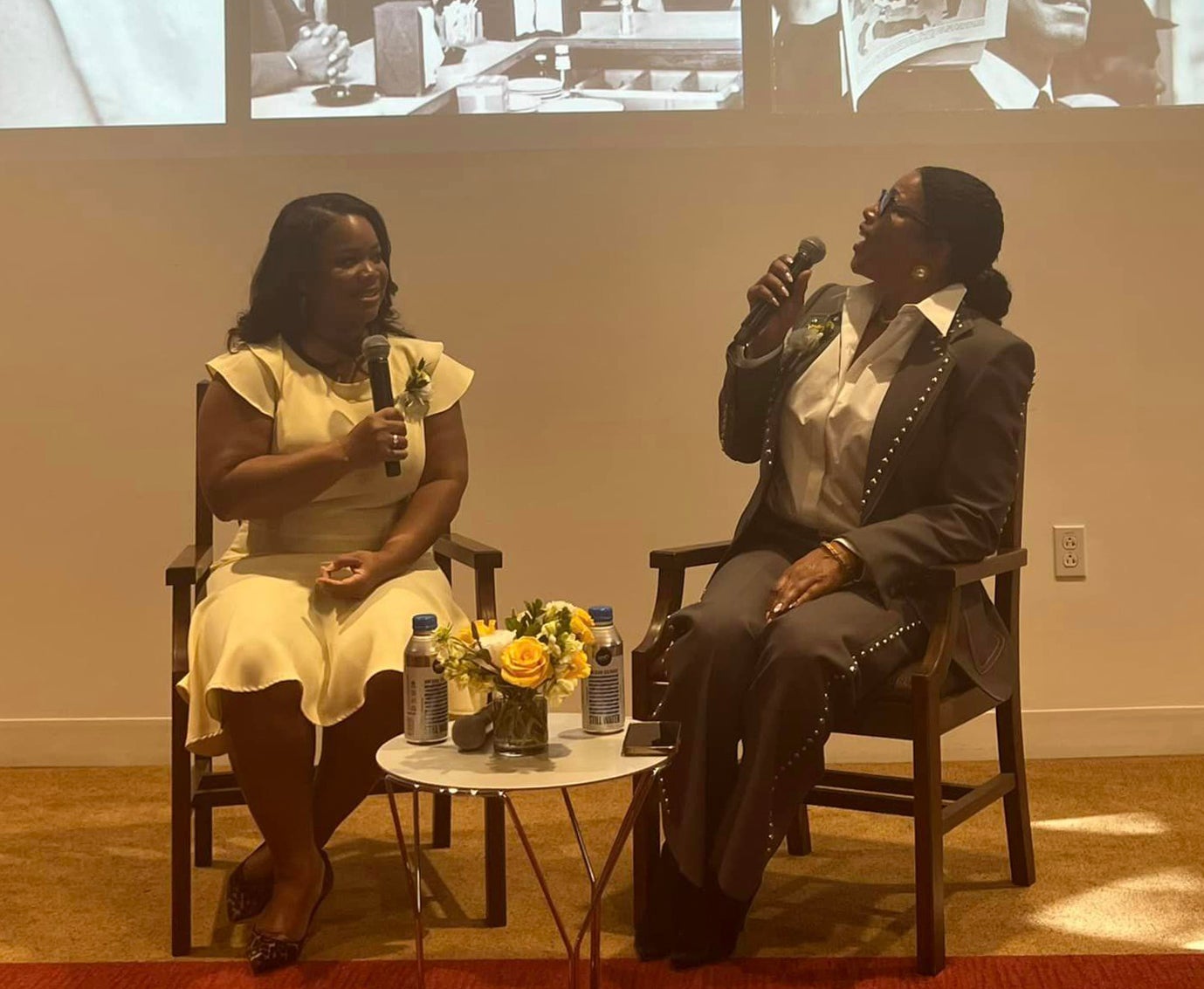
Ilyasah Shabazz, the daughter of Malcolm X, speaks to audience of approximately 150 people inside The Sheindlin Forum. (USC Photo/Greg Hernandez)
Malcolm X’s daughter Ilyasah Shabazz rewrites the script on her family’s legacy
A conversation at USC Annenberg with the author and activist highlights the celebration of Charlotta Bass Day.
Author and activist Ilyasah Shabazz, daughter of civil rights icon Malcolm X, wants her father to be remembered less as a controversial figure and more as someone who brought human rights to the forefront of the Civil Rights Movement.
“When I think of my father, I’m so proud of him because he was only in his 20s when the world learned of him,” Shabazz told a capacity crowd inside Wallis Annenberg Hall’s Sheindlin Forum on Feb. 13. “When we look at the image that was portrayed of him, it’s so inaccurate. Certainly, the Malcolm X that we may have learned about in school or in the papers is not the Malcolm X in his truth.”
Shabazz sat in conversation with Allissa V. Richardson, associate professor at the USC Annenberg School for Communication and Journalism and founding director of the Charlotta Bass Journalism and Justice Lab, as part of USC’s celebration of Charlotta Bass Day. The lab’s namesake was a trailblazing journalist, editor and activist who owned and operated the California Eagle newspaper, one of the first Black publications in the West.

During the event, the Bass Lab also unveiled an interactive interview with Shabazz from its Voices of a Movement series, conducted through its Second Draft Project in collaboration with the USC Digital Repository. The project offers those who have been connected to, or been at the center of, pivotal moments in social justice in the United States an opportunity to highlight where they feel media fell short in telling the story. The interactive interviews also allow online viewers to ask questions to an AI version of each subject. For her interview, Shabazz recorded answers to more than 200 questions posed to her by Richardson.
Shabazz is the second interview for the series, which debuted last year with testimony from Lora King, the daughter of Rodney King. Lora King was present to introduce Shabazz at last week’s event.
RELATED: Learn more about Ilyasah Shabazz’s interview with The Second Draft Project.
Setting the record straight in her own words
Both in her live remarks and through answers given during her interactive interview, Shabazz made clear that she objects to her father’s portrayal in the media as an aggressive, provocative leader.
She pointed out that many images the public saw of her father were in response to such heinous acts as bombings, murders and fires and that he was articulating the grief and anger of Black Americans who were facing discrimination, violence and terror in their own country. Shabazz said she wants people to know that Malcolm X wasn’t led by anger but was filled with faith, love and compassion.
A historic location
When Shabazz first agreed to participate in the interview series several months ago, she had one specific requirement: The oral testimony had to be conducted inside the Audubon Ballroom in New York City, nearly 3,000 miles from USC’s University Park Campus.
“They came to the place where my father was gunned down on Feb. 21, 1965,” Shabazz told the Sheindlin Forum audience.
Malcolm X was shot 21 times inside of the ballroom as he prepared to speak to the Organization of Afro-American Unity. The American Muslim minister and vocal advocate for Black empowerment was just 39. Shabazz and her three older sisters were seated toward the front of the room on that day accompanied by their mother, Betty Shabazz, who was pregnant with twin girls.
The ballroom is now home to the Malcolm X and Dr. Betty Shabazz Memorial and Educational Center. Shabazz explained why the ballroom was transformed into the center: “My mother turned this place that once represented tragedy into a place of triumph. It’s a place where young people can come and learn about this legacy that she safeguarded for so long and be inspired by it.”
Pride for both of her iconic parents
“We want to tell a new story about who Dr. Shabazz’s father was,” Richardson said during the event. “Malcolm X, as many of you know, is a towering figure in civil rights. What we don’t know is that perhaps the real MVP is Dr. Betty Shabazz, who raised his most important legacies: his six girls.”
Shabazz is equally proud of her late mother, whom she described as “just so incredible” and “a free spirit filled with so much love and care.”
“She was very happy to walk into Audubon Ballroom, really happy and excited on [that] Sunday afternoon,” Shabazz said, of the day her father was murdered. “She walked out devastated and a whole new person. But she never became a victim of her experience. It’s something that I carried with me, because had she become a victim, I certainly wouldn’t be sitting here talking to you.”
Legacy of Bass continues at USC
Gordon Stables, director of USC Annenberg’s School of Journalism, said at the event that while journalism has often been described as “the first draft of history,” that familiar phrase does not capture the fact that the first draft can leave out or speak over far too many — often the most marginalized members of society.
“But those problematic first drafts don’t exist in perpetuity,” Stables said. “What they need are ethical and thoughtful journalists and scholars who are committed to getting it right — professionals who are committed to a more accurate and inclusive second draft.”
Bass herself embodied that insistence on foregrounding those untold stories, using her newspaper to wage battles against injustices such as segregation and discrimination in employment and housing.
USC Annenberg Dean Willow Bay described Bass as a woman who “committed her life to telling stories of Black Americans with honesty, bravery and conviction.”
“[The Bass Lab] continues her legacy through their practice of reparative journalism and the work on The Second Draft Project,” Bay said. “It’s journalism that demands radical inclusivity, where the stories of those on the peripheries are not just heard, but they’re elevated. They’re told with respect, and they’re told with dignity.”



